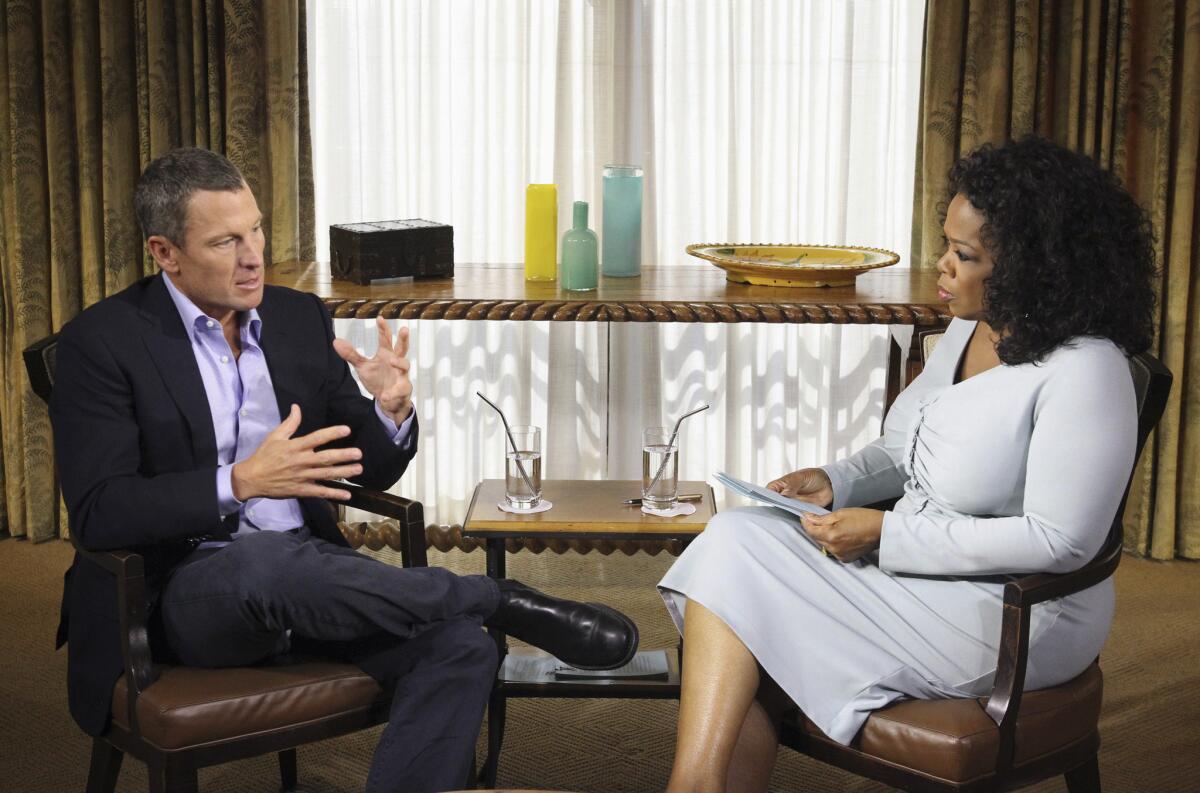Sorry, Ryan Lochte and Nate Parker. The talk show apology tour has collapsed

The day after it was revealed that he and three teammates had not been randomly robbed at gunpoint during the Olympic Games in Rio, swimmer and gold medalist Ryan Lochte offered the world an apology via Instagram.
It was quickly derided by many, in media mainstream and social, as shallow, boilerplate and/or literally the least he could do. Within days, Lochte lost at least four major sponsors.
A few days before, filmmaker Nate Parker wrote at length on Facebook about the feelings he experienced after being told that the woman he had been accused and acquitted of raping 17 years ago had committed suicide in 2012.
The post was quickly described by many, in media mainstream and social, as a deflection of a serious issue and/or a self-centered bid for sympathy amid a publicity tour for Parker’s upcoming “Birth of a Nation.” Within days, there were calls for a boycott of the film.
If there’s a Bat Signal for Oprah Winfrey or Barbara Walters, someone needs to light that sucker up. As erring celebrities keep “discovering,” social media may have many uses, but providing a platform for sincere expressions of deep regret isn’t one of them.
For that, you need an old-school talk-show apology tour.
Unfortunately, amid all the fuss over television’s golden age and overcrowding, the infrastructure for that particular public service has quietly collapsed.
It used to be easy. A slip of the tongue, an arrest for solicitation, a revelation of marital or professional chicanery and the path to redemption was clear: Twenty Hail Marys and a long sit-down with Oprah, (two nights if you were Lance Armstrong.) A much publicized Barbara Walters special, or a tough-but-fair interview with Katie Couric or Diane Sawyer. Humbly enduring the mocking ministrations of Jay and Dave was a must.
Over the years, dozens of erring celebrities and public figures — Hugh Grant, Robert Downey Jr., Isaiah Washington, John Edwards, James Frey — made the apology tour. Whitney Houston and Marion Jones opened up about their (very different) drug problems to Oprah, Kanye West wept in front of Jay Leno as he apologized for dissing Taylor Swift at the 2009 VMAs; Jerry Seinfeld and David Letterman played midwife to Michael Richards’ visibly chagrined apology for using racist language when dealing with a heckler.
This is precisely what Lochte, Parker and, for that matter, the still-feuding West and Swift, need to do: Explain, apologize and offer penance to an anointed confessor in front a large television audience so we can all move the heck on.
Unfortunately, most of the master confessors are gone. Barbara, Jay and Dave are retired; Oprah is busy with OWN and other projects, Couric’s making documentaries. Only Sawyer remains, “20/20’s” lone sentinel of air-clearing, confessional and generally transformative television interviews.
Public sin-eating, like so many old-media jobs, has been phased out by the digital revolution. But when posts don’t cut it, a public reprobate has few places in which to turn.
This became painfully obvious when Lochte (or his publicist) realized that Instagram had not been the best play. The disgraced swimmer dutifully pulled on a button-down and presented himself to Matt Lauer in an effort to take “personal responsibility” for “immature and intoxicated behavior.” Lauer rose to the occasion by putting on his “aggrieved” face and pushing Lotche to apologize to the good people of Rio. After which, Lauer gravely let it be known that he believed Lochte was truly sorry for what he had done.
Whatever, Matt. Absolution is not yours to give because this is not your arena. As the interview made very clear. A master confessor first leads the penitent through his or her actions. (“Tell us exactly what happened,” Couric would have asked, right off the bat.) She or he is not afraid to ask the tough questions, using the tough words (“Embarrassed?” Oprah might have said. “Or ashamed? Because there’s a difference”), to call a con artist on his crap (“What exactly were you thinking, son?” Letterman most certainly would have wondered. “I mean how much alcohol are we talking about?”), all while radiating a perfect balance of skepticism and empathy, disappointment and faith.
Stephen Colbert’s hilarious sendup of the interview had the tough skepticism, though being a sendup, none of the heart, quashing any hope that Colbert might become a next-generation confessor (he is Catholic after all.)
Instead, we are left with Matt Lauer heading a major apology tour — how on earth did it come to this?
How are we, as a nation, supposed to process our anger/grief/disappointment when yet another idol falls, to collectively understand, empathize and forgive?
Through the agitated and agitating tappings of Twitter? The endlessly random posts of digital opinion? There is no closure in the inevitable 7,345 essays from the disparate contributors to HuffPo that follow any cultural event or the endless media alerts from every platform desperate for traffic, which is every platform. These provide only more things to disagree over, more things to argue about, which only compounds the original transgression — not only did Ryan Lochte tarnish the Olympics, now he’s dominating the news cycle when there are clearly more important things to talk about!
Public atonement requires public abasement and for public abasement, you need television. It’s not enough for a star/hero/senator/role model to admit to being human (um, we know that), the audience needs to see that humanity first-hand, judge it for themselves. Viewers need to see the deep regret and inner pain for themselves, need to gauge the level of sincerity in the explanation.
As we’re discovering, it’s a deceptively significant ritual that is very difficult to perform.
Real penitential television is an art form and it’s in danger of being lost.
Certainly no obvious replacement for Oprah or Barbara has emerged and the new late-night hosts lack the gravitas. Colbert is clearly still a satirist, Jimmy Fallon too goofy and James Corden would rather sing (although the car has a confessional power all its own).
Ellen DeGeneres has the audience, the respect and the sofa but she’s way too upbeat for sin-eating. Rachel Maddow lacks the patience, Brian Williams the credibility. By interviewing the Duggar family and her personal nemesis Donald Trump, Megyn Kelly appears at least interested in the role, but she hasn’t yet figured out how to be non-combative without going completely soft.
Anderson Cooper might be able to do it, though he hasn’t shown any interest in the kind of soul-searching interviews Barbara Walters made famous. It’s a tough gig, with much potential for mockery, but clearly someone needs to step up, and soon.
Meanwhile, can someone at least touch base with Oprah’s people?
ALSO:
Despite TV ratings drop, NBC says the Rio Games was still a financial success
Andrea Tantaros calls Fox News a ‘sex-fueled Playboy Mansion-like cult’ in lawsuit
‘Inside Amy Schumer’ slated for Season 5 but won’t be on in ‘foreseeable future,’ Schumer confirms
More to Read
The complete guide to home viewing
Get Screen Gab for everything about the TV shows and streaming movies everyone’s talking about.
You may occasionally receive promotional content from the Los Angeles Times.







